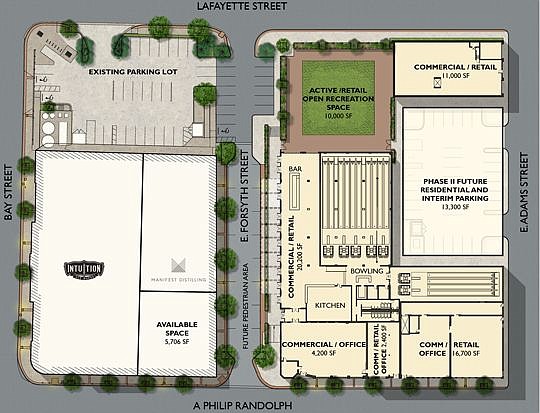
When buyers of the George Doro Fixture Co. property in the Stadium District bought the site almost a year ago, they talked about their vision for the property.
They saw food-related uses, offices and residences at the former manufacturing site that would tie in with the neighboring former Noland Building they own that is occupied by Intuition Ale Works and Manifest Distilling.
Talk could be turning into action.
Iconic Real Estate Investments LLC wants to redevelop the Doro site and encompass the former Noland Building into a project called the Doro District.
“We want to redesign and reimagine that area that’s been dormant,” said Iconic Investments president Farley Grainger.
The Downtown Development Review Board is slated to look at a conceptual plan next week to redevelop the Doro site.
The Doro property is at 102 A. Philip Randolph Blvd. near EverBank Field and the new Daily’s Place amphitheater and flex field.
The ownership group is led by Grainger and his son, Paul, who bought the 1.63-acre Doro property in March for $2.5 million. It bought the former Noland property a year earlier for $2.2 million.
Plans show the Doro property as a bowling alley, bar, offices, retail and, later, residential. It would complement the uses at 929 E. Bay St.
Grainger said Monday the combined 3-acre site, known as the Doro District, will expand the concept his group started.
“We’re looking for that walkable campus with complementary uses,” he said.
DDRB is slated to review the conceptual Doro plan Feb. 16.
The site plan shows the Doro Fixture property is bordered by A. Philip Randolph Boulevard and East Adams, Lafayette and East Forsyth streets.
The entire project is bordered by A. Philip Randolph and Bay, Lafayette and East Adams streets.
East Forsyth Street, which runs between Manifest Distilling and the Doro property, is privately owned and shown as a future pedestrian area.
The Doro District Mixed Use Project written description said the Doro Fixture buildings were built between 1903 and the 1950s. The vacant structures comprise about 65,000 square feet.
Iconic wants approval for the infill redevelopment of the buildings with retail commercial, office and hotel/multifamily residential uses in two phases.
The first phase would be 44,500 square feet for a restaurant, bar, bowling venue and entertainment uses. Another 10,000 square feet would be developed with retail and open recreation uses and another almost 10,000 square feet for commercial offices.
That phase would include a rooftop terrace retail space on the A. Philip Randolph Boulevard frontage.
The second phase would be development of multifamily residential, although the number of units has not been determined. That would be in a two-story structure.
As part of the first phase, one of the existing buildings would be demolished to create an interim off-street parking lot. Iconic Investments will request a parking deviation for its needs.
The architect is Design Cooperative.
Farley Grainger said Monday his group would like to start development this year for completion of the first phase late this year or in early 2018. He said they were talking with food-related tenants but he declined to identify them.
Paul Grainger said at the time of the Doro acquisition that the focus would be leasing to local tenants who will be catalysts to redevelop the area.
About 5,700 square feet for retail space remains for lease at 929 E. Bay St., according to DDRB plans.
The Doro company, in business since 1919, fabricated architectural woodwork, casework and millwork. The property includes warehouse space among several buildings along with a parking lot.
Together, the East Bay Street and Doro Fixture properties total about 100,000 square feet of space.
Grainger said he was excited about the amphitheater. “We’re trying to continue that destination, social experience,” he said.
Iconic has not requested economic incentives for the development.
“We haven’t gotten that far in our analysis yet,” Grainger said.
@MathisKb
(904) 356-2466